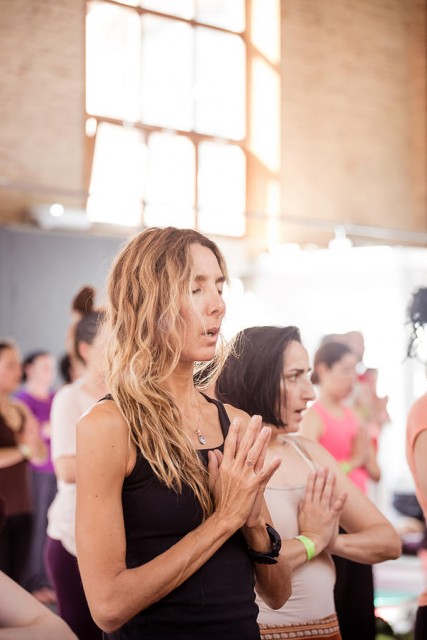
I appreciate all of my yoga teachers. I am grateful for the seemingly magical influence they can have over my mood and well-being.
Yoga teachers exude good energy, and their optimism is usually contagious, but sometimes I feel like they go a little overboard…
When this happens, their encouragement can have the opposite of the desired effect. Sometimes I get frustrated in class—really frustrated—and there’s one thing I wish yoga teachers would stop saying:
“If you can visualize it, you can do it.”
I know they mean well. I’m pretty sure they believe what they’re saying, too, and I definitely get the whole law of attraction thing. Obviously if we immediately throw up the mental roadblocks when confronted with something new and difficult, if we don’t even try, we won’t be able to do anything.
Yet it’s also important to be realistic about our range of abilities. Yes, even when it comes to yoga. Some of those poses are profoundly difficult, take years and years of practice and physical conditioning, and could be dangerous for inexperienced practitioners.
Yoga classes are diverse. I see everyone from teenagers, senior citizens, professional athletes and personal trainers, to students healing from injuries or battling grave diseases. There are people who have been involved in sports or dance since early childhood, and people like me whose preferred level of physical activity is turning pages and lifting a coffee mug. But we’re all there, and we’re all trying.
I am far from an advanced yogi. I am a woman in her 40s who has an autoimmune disease that causes muscle weakness and joint pain. This often makes yoga hard, but I do my best and I keep at it. The little bit that I can do makes me feel a lot better, though it doesn’t “cure” anything. Still, I feel guilty and suffer from low self-esteem in yoga because I’m not doing more or better or improving faster.
When teachers tell me that if I can visualize it, I can do it, I don’t always feel inspired. Sometimes, I feel worse and blame myself when I can’t “do it.”
I can easily visualize myself doing all kinds of advanced yoga poses. I can visualize myself in a healthier body, a more traditionally attractive body, a thinner body, the body I had when I was younger and took it for granted that I’d always be hot, tiny and flexible. I can visualize all day long.
I can visualize myself flying through the stratosphere if you want me to, and I can visualize myself turning into a real-live mermaid too, but that will never make it actually happen.
A consistent yoga practice can help keep us grounded, and a big part of being grounded is maintaining realistic expectations for ourselves and others—even when it comes to yoga. Here is a realistic expectation: a 25-year-old former competitive gymnast who is free from injury should (with practice) easily accomplish the full expression of a scorpion pose. Here is an unrealistic expectation: a 40-something-year-old woman with a connective tissue disorder, who has no history of being athletic, will definitely be able to turn herself into a contortionist (with practice) and put the soles of her feet on the back of her head while holding herself up by the elbows. Not going to happen. I get that there may be outliers here, but I’m not going to be one of them.
That’s an extreme hypothetical example, so how about a real-life anecdote?
Last winter I got it into my head that I wanted to be able to do a straddle split. At this point, about all I can manage with my legs is a very acute angle. Sitting down, I can get my legs to 45 degrees, yet I began to strongly visualize a nice 180. I set my intention. I imagined. I saw myself accomplishing my totally ego-driven goal of that straddle. I believed so hard that I tore my right hamstring like a snapped rubber band, and I couldn’t walk for a week. It took over six months to fully heal, and it still aches, but I’m thankful it wasn’t worse.
If we want to improve or reach any goal, it’s important to visualize our success, but it’s also important for each person to recognize and then accept his or her physical limitations. Instead telling us that we can literally “do anything,” a belief that can cause unrealistic expectations and disappointment, yoga teachers might be of more benefit if they helped us to be grateful for where we are in our practice in the present moment, rather than striving and competing with ourselves for an arbitrary future achievement.
Our bodies are all designed differently. There are poses that many people will never be able to do, and there is nothing wrong with that. It doesn’t mean that a person impeded their own progress with negative thinking. And ultimately, isn’t the whole point of yoga to slow down, burn away our ego-driven desires, and stop grasping for the future? Ultimately, shouldn’t we be grateful for what we can do right now?
~
Author: Victoria Fedden
Image: Used with permission from Cecille Photography
Editor: Toby Israel
~


 Share on bsky
Share on bsky




Read 0 comments and reply